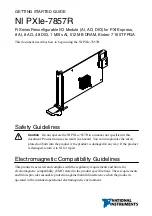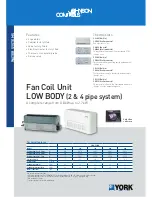
© National Instruments
|
4-9
Analog Input Data Acquisition Methods
When performing analog input measurements, you either can perform software-timed or
hardware-timed acquisitions.
Software-Timed Acquisitions
With a software-timed acquisition, software controls the rate of the acquisition. Software sends
a separate command to the hardware to initiate each ADC conversion. In NI-DAQmx,
software-timed acquisitions are referred to as having on-demand timing. Software-timed
acquisitions are also referred to as immediate or static acquisitions and are typically used for
reading a single sample of data.
Hardware-Timed Acquisitions
With hardware-timed acquisitions, a digital hardware signal (AI Sample Clock) controls the rate
of the acquisition. This signal can be generated internally on your device or provided externally.
Hardware-timed acquisitions have several advantages over software-timed acquisitions:
•
The time between samples can be much shorter.
•
The timing between samples is deterministic.
•
Hardware-timed acquisitions can use hardware triggering.
Hardware-timed operations can be buffered or non-buffered. A buffer is a temporary storage in
computer memory for to-be-generated samples.
•
Buffered
—In a buffered acquisition, data is moved from the DAQ device’s onboard FIFO
memory to a PC buffer using DMA or interrupts before it is transferred to application
memory. Buffered acquisitions typically allow for much faster transfer rates than
non-buffered acquisitions because data is moved in large blocks, rather than one point at a
time.
One property of buffered I/O operations is the sample mode. The sample mode can be either
finite or continuous.
–
Finite sample mode acquisition refers to the acquisition of a specific, predetermined
number of data samples. Once the specified number of samples has been read in, the
acquisition stops. If you use a reference trigger, you must use finite sample mode.
–
Continuous acquisition refers to the acquisition of an unspecified number of samples.
Instead of acquiring a set number of data samples and stopping, a continuous
acquisition continues until you stop the operation. Continuous acquisition is also
referred to as double-buffered or circular-buffered acquisition.
Summary of Contents for PXI-6289
Page 1: ...PXI 6289...
















































